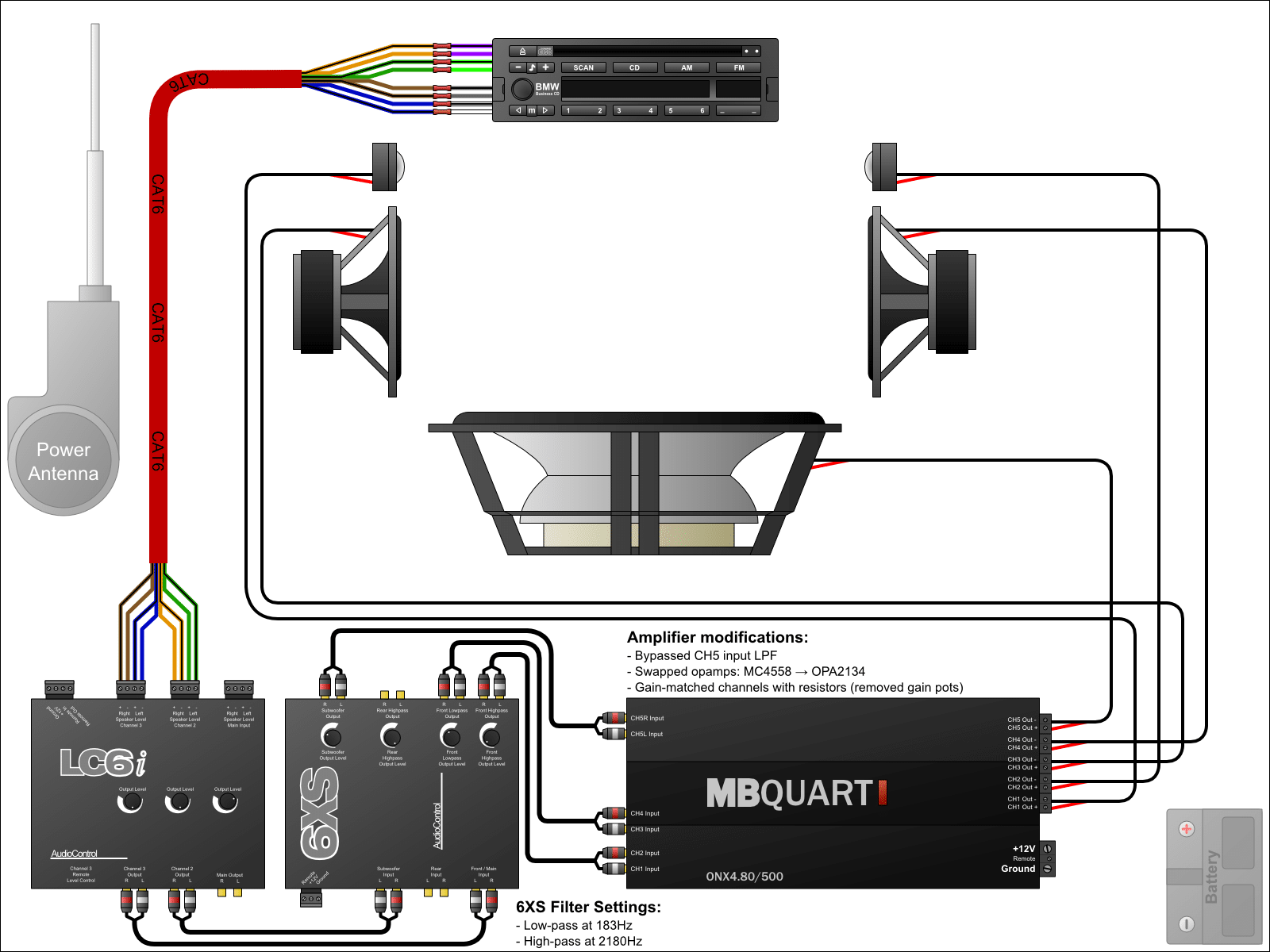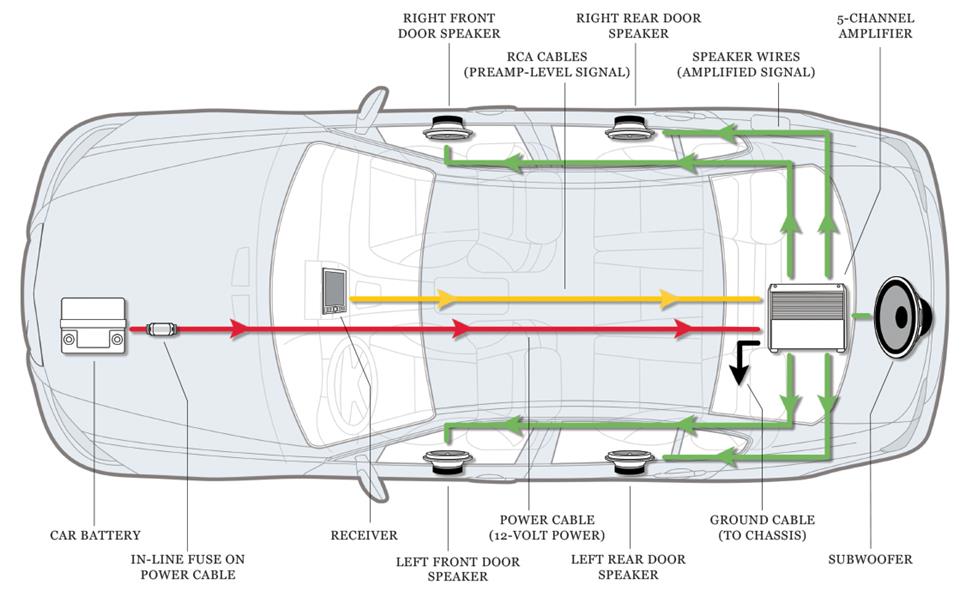Car Audio Upgrade: Subwoofer and Amplifier Installation Guide
Want to transform your car into a rolling concert hall? Adding a subwoofer and amplifier can dramatically improve your car audio experience, providing deep bass and crystal-clear sound. While it might seem daunting, installing a subwoofer and amp isn't rocket science. With a little patience and the right guidance, you can achieve professional-quality results without breaking the bank.
Connecting a subwoofer and amplifier requires understanding the basic principles of car audio systems. This involves figuring out how to run power from your car's battery to the amplifier, connecting the amplifier to the head unit, and finally, wiring the subwoofer to the amplifier. This guide will break down the process step by step, empowering you to tackle this project with confidence.
Car audio amplification and subwoofer integration became popular in the latter half of the 20th century as people sought to enhance their in-car listening experience. Initially, installations were complex and often handled by professionals. However, with advancements in technology and readily available resources, setting up a sub and amp has become much more accessible to the average car owner. The primary issue with subwoofer and amplifier installation often revolves around understanding the wiring. A poorly wired system can lead to blown fuses, damaged equipment, and even electrical fires.
Before diving in, it's helpful to understand some key terms. The "head unit" is your car's stereo. The "amplifier" boosts the audio signal, providing power to the subwoofer. The "subwoofer" is a specialized speaker designed to reproduce low-frequency sounds, giving you that rich, deep bass. Wiring kits typically include power cables, ground cables, speaker wire, and RCA cables, which transmit the audio signal.
A well-installed subwoofer and amp combo offers several benefits. First, it enhances sound quality, offering a fuller, richer audio experience. Second, it allows for higher volume levels without distortion. Finally, it can increase the resale value of your car, appealing to audio enthusiasts. For instance, imagine listening to your favorite song with clear highs and powerful bass, even at highway speeds. That’s the difference a good sub and amp can make.
Planning your installation is crucial. First, choose the right equipment for your budget and needs. Second, gather your tools, including wire strippers, crimpers, and a multimeter. Third, plan the wiring route, ensuring the cables are away from moving parts and heat sources. One successful example involves mounting the amplifier under the driver’s seat and running the power cable along the door sill.
Checklist for Sub and Amp Installation:
Power cable, Ground cable, Speaker wire, RCA cables, Fuse holder, Fuses, Wire strippers/crimpers, Screwdriver, Drill (if needed), Multimeter
Step-by-Step Guide
1. Disconnect the negative terminal of your car battery.
2. Run the power cable from the battery to the amplifier location.
3. Connect the ground cable to a clean, metal surface on the car chassis.
4. Connect the RCA cables from the head unit to the amplifier.
5. Connect the speaker wire from the amplifier to the subwoofer.
6. Connect the remote turn-on wire to the head unit.
7. Reconnect the negative battery terminal.
Recommended Resources: Crutchfield website and their mobile app.
Advantages and Disadvantages
| Advantages | Disadvantages |
|---|---|
| Enhanced Sound Quality | Installation Complexity |
| Increased Volume | Potential Power Drain |
| Improved Resale Value | Cost of Equipment |
Best Practices:
1. Use high-quality wiring kits.
2. Secure all wiring with zip ties.
3. Avoid grounding the amplifier to painted surfaces.
4. Use an inline fuse near the battery connection.
5. Double-check all connections before powering on the system.
FAQs:
1. Q: How much power do I need? A: It depends on the subwoofer and your desired volume level.
2. Q: Can I install this myself? A: Yes, with proper guidance and tools.
3. Q: Where should I mount the amplifier? A: Under the seat or in the trunk are common locations.
4. Q: What gauge wire should I use? A: It depends on the amplifier's power requirements.
5. Q: How do I tune the system? A: Use the amplifier's gain and crossover settings.
6. Q: My subwoofer isn't working. A: Check all connections and fuses.
7. Q: My amplifier is overheating. A: Ensure proper ventilation and wiring.
8. Q: How do I connect multiple subwoofers? A: You may need a more powerful amplifier or use a wiring configuration like series or parallel.
Tips & Tricks: Use a multimeter to check connections, research your specific car model for wiring diagrams, and consider using sound deadening material to improve bass response.
Boosting your car's sound system by adding a subwoofer and amplifier is a rewarding project that can significantly enhance your driving experience. From choosing the right equipment to following the wiring steps carefully, every part of the process contributes to the final outcome. While challenges might arise, readily available resources and a little patience can make overcoming them easier. Remember to plan your installation, use quality components, and double-check all connections for a safe and successful upgrade. The enhanced sound quality and increased volume you’ll enjoy will make all the effort worthwhile. So, grab your tools and get ready to transform your car into a mobile sound sanctuary! Enjoy the music!
Grandmothers love in every hue celebrating mothers day with feliz dia de la madre abuela para colorear
Cracking the wordle code may 8th hints and strategies
Turning 26 navigating the health insurance maze














